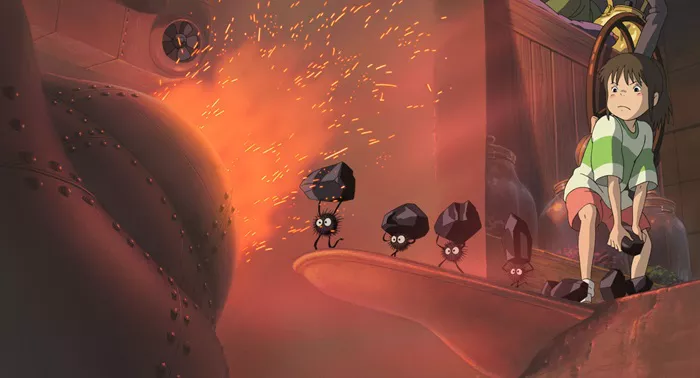Hayao Miyazaki’s “Spirited Away” is a masterpiece of contemporary animation that has captivated audiences around the world with its rich tapestry of fantasy, layered narratives, and visually stunning artistry. Released in 2001 by Studio Ghibli, the film follows the story of a young girl named Chihiro who, through a series of unusual and unexpected events, finds herself in a magical world working in a bathhouse for the gods. This film is often noted for its dreamlike sequences and bizarre elements, which can be both enchanting and perplexing. In this article, we delve deep into why “Spirited Away” is considered “weird” by exploring its thematic elements, cultural context, and the unique storytelling methods that Miyazaki employs to challenge and expand the viewer’s imagination.
The Essence of “Spirited Away”
To understand the perceived weirdness of “Spirited Away,” it is essential to grasp the foundational elements that define the film, including its plot, character development, and setting.
Plot Overview
“Spirited Away” begins with ten-year-old Chihiro Ogino and her parents stumbling upon an abandoned amusement park. The journey takes a twist when her parents turn into pigs after eating food meant for the gods, and Chihiro finds herself trapped in a supernatural realm. The story unfolds as she navigates this new world, meets its mystical inhabitants, and matures from a sullen, fearful child into a capable, brave young woman.
Character Development
Chihiro’s transformation is central to the film’s narrative. As she interacts with complex characters like Haku, Yubaba, No-Face, and others, she learns about loyalty, bravery, self-reliance, and forgiveness. Each character she encounters is deeply nuanced, contributing to the story’s rich emotional and thematic tapestry.
Setting and World-Building
The bathhouse where most of the film’s action takes place serves as a microcosm of society, with a clear hierarchy, labor disputes, and a blend of the traditional and the supernatural. This setting contributes significantly to the film’s surreal and bizarre atmosphere.
Cultural Context and Mythological Underpinnings
“Spirited Away” is deeply rooted in Japanese Shinto beliefs and folklore, which may contribute to its perceived weirdness by those unfamiliar with these elements.
Shinto Influences
Shinto, an indigenous faith of the Japanese people, focuses on kami (spirits or gods) that exist in the natural world. The film is replete with references to these spirits, which inhabit everything from rivers and bridges to food and other objects. This animistic belief system creates a world where the mundane becomes sacred and bizarre to those outside this cultural context.
Integration of Folklore
The film incorporates numerous elements of Japanese folklore, including spirits like Yubaba, who resembles a traditional witch from Japanese fairy tales, and No-Face, who embodies aspects of both a faceless ghost and a needy spirit. The unfamiliarity of these folklore elements to international audiences adds layers of mystery and oddity to the narrative.
Narrative Techniques and Artistic Choices
Miyazaki’s storytelling is unconventional. His narrative techniques and the film’s visual style play essential roles in crafting its “weirdness.”
Non-Linear Storytelling
Unlike traditional Western storytelling, which often follows a straightforward, goal-driven plot, “Spirited Away” uses a more fluid, episodic narrative structure. This approach reflects the unpredictable nature of life and dreams, contributing to the film’s surreal quality.
Symbolism and Metaphor
Miyazaki uses visual and contextual symbolism to enrich the narrative. Objects and characters often have dual meanings, representing societal issues, personal growth, or historical events. For instance, the polluted river spirit that Chihiro cleans represents environmental degradation.
Surreal Imagery
The film’s imagery often borders on the fantastical and grotesque, from the gluttonous parents turned into pigs, to the myriad of eccentric spirits visiting the bathhouse. This imagery, while visually striking, can also be disorienting and strange, enhancing the film’s dreamlike quality.
Themes and Philosophical Overtones
The depth of “Spirited Away” is not just in its storytelling or art, but also in its exploration of complex themes.
Critique of Modern Society
At its core, the film is a critique of modern capitalism and consumerism, portrayed through the greed seen in the bathhouse’s guests and Chihiro’s parents. The weirdness in these depictions can be unsettling as it mirrors and distorts real-world behaviors in fantastical forms.
Coming-of-Age Story
The film is also a profound coming-of-age story. Chihiro’s journey through the spirit world parallels the journey into adulthood, filled with unknowns and challenges that, while weird and frightening, are also transformative.
Exploration of Identity and Self
Chihiro’s loss and reclamation of her name is a powerful narrative about maintaining identity in a world that constantly tries to define us. This subtle yet profound exploration adds to the film’s richness and perceived weirdness, as it challenges viewers to think deeply about the concept of self.
Conclusion
“Spirited Away” is considered weird because it operates on many levels, from its rich tapestry of mythological elements and complex themes to its surreal imagery and non-linear narrative structure. For those unfamiliar with its cultural underpinnings or unaccustomed to such narrative depth in animation, the film can seem especially strange. However, this weirdness is precisely what makes “Spirited Away” a masterpiece. It invites viewers into a deeply immersive world that not only entertains but also provokes thought, evokes emotion, and stirs the imagination. Through Chihiro’s eyes, we are reminded of the wonders and weirdness of the world around us, encouraging a deeper appreciation of both the seen and the unseen.

